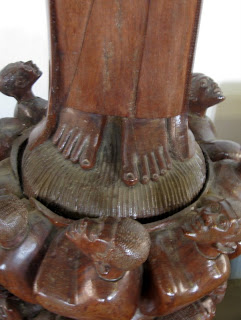A gently swaying hammock under the whispering pines. A lonely dhow anchored a hundred yards offshore. A vast sea-green sea that stretches to forever. Coconut palm fronds waving in the wind. A brisk salty sea breeze. Although we were surrounded by fragrant frangipani, flame trees, fiery red hibiscus & brilliant bougainvillea, there was not a soul around.
Sunshine, serenity & solitude by the sea! How delightful!
Taking advantage of our month long school break , Earl & I hopped on a tightly packed bus for a 9+ hour rough & tumble ride to Dar. After a couple of days at the less than luxurious & very cheap YMCA (shared bath, cold water & no towels), we boarded the Sea Bus ferry for a 2 hour sea voyage to the magical isle of Zanzibar aka Unguja Island.
Greeted by Father Damas at the hustling, bustling & extremely chaotic ferry terminal, we climbed into his old army jeep and circled around Zanzibar Town. On our way to the heart of the city, Stone Town, we caught glimpses of narrow streets & cobbled alleyways, women draped in black, overhanging verandas, colorful TingaTinga art, bustling bazaars, the Sultan's Palace, Beit El-Ajaib (House of Wonders), street-side vendors, and numerous Moslem minarets piercing the azure sky. The sun was sizzling hot & there was a spicy aroma in the air. Father Damas dropped us off at the Bishop's House, next door to St. Joseph's Cathedral. Also known as "Kanisa la Minara Miwili" (Church with Two Towers), the cathedral was built in 1898 by a French architect. At first glance, one might think one was in Paris!
Sister Laurent, our hostess, escorted us to our simply furnished room with bed & bath. Our window overlooked the narrow street below which was splashed with brightly colored paintings of everything African: dancers & drummers, zebras & giraffes, sun & seascapes, mud huts & mangroves. The highlight of our Stone Town stay was the House of Wonders, home to the Zanzibar National Museum of History & Culture. Besides viewing a life-sized mtepe, a traditional Swahili sailing vessel made without nails, the planks held together only with coconut fibers & wooden pegs, we learned about Princess Salame who secretly eloped with a German soldier & spent almost the rest of her life in Germany. A woman before her time, she was an advocate for healthcare & the education of women.
After our brief stay in the soul of Zanzibar Town, we bussed 60km to the northernmost tip of Zanzibar where we were perched on a small seaside outcrop with a spectacular view of the Indian Ocean. We stayed 3 days at the Mnarani Beach Cottages in Nungwi (private bath, hot water & BIG towels!), a real splurge for us - once every 16 years. The last splurge was on our honeymoon at the Keltic Lodge in Cape Breton, Nova Scotia. On Cape Breton we were 46+ degrees north of the equator and here we could practically touch it! Mnarani means "lighthouse" which was right next door. Built in 1888, the 70 foot tall lighthouse is still blinking!
Earl & I also ventured on a Spice Tour where we met other tourists from England, Holland, Liechtenstein, Canada & Tanzania. Nassor, our Zanzibari tour guide, led us on a leisurely stroll through the jungle-like plantation sprinkled with wild orchids. We nipped nutmeg from the tree, plucked lemon grass from the earth, scraped cinnamon bark off the tree, painted our faces with red Masai powder, whiffed vanilla beans on the vine, rolled peppercorns between our fingers, sniffed a bouquet of fresh cloves, and fingered smooth cones of cayenne peppers. We also sampled a medley of fresh picked fruit such as papaya, jackfruit, star fruit, mangoes, marmalade oranges, and pineapple. Our guides adorned us with woven jungle leaf jewelry - ties, necklaces, rings & bracelets. After a hot lunch of traditional foods such as coconut soup, pilau, & sauteed spinach (all seasoned with the spices we just sampled) in the shade of a thatched roof banda, we descended into the deep dark seaside Slave Cave. After Nassor shared a little Slave Cave history, we climbed out of the dark & into the light to take a refreshing dip in the Indian Ocean.
After an exceptionally crazy non-stop school year, we had a wonderfully relaxing holiday! Diane



















































